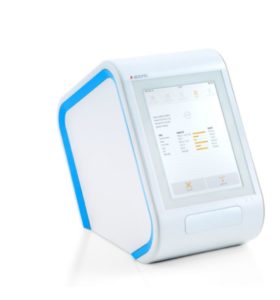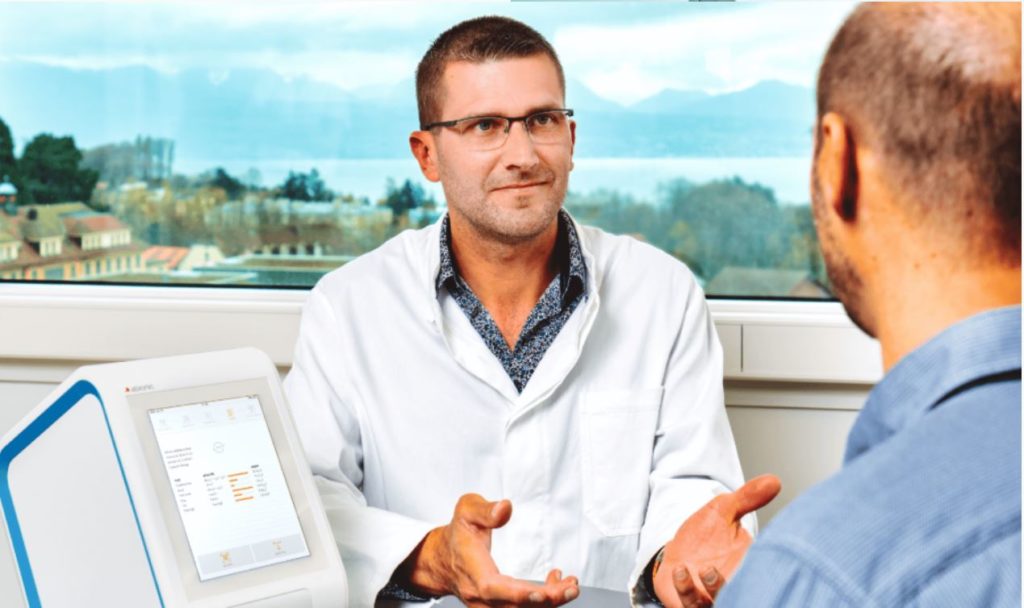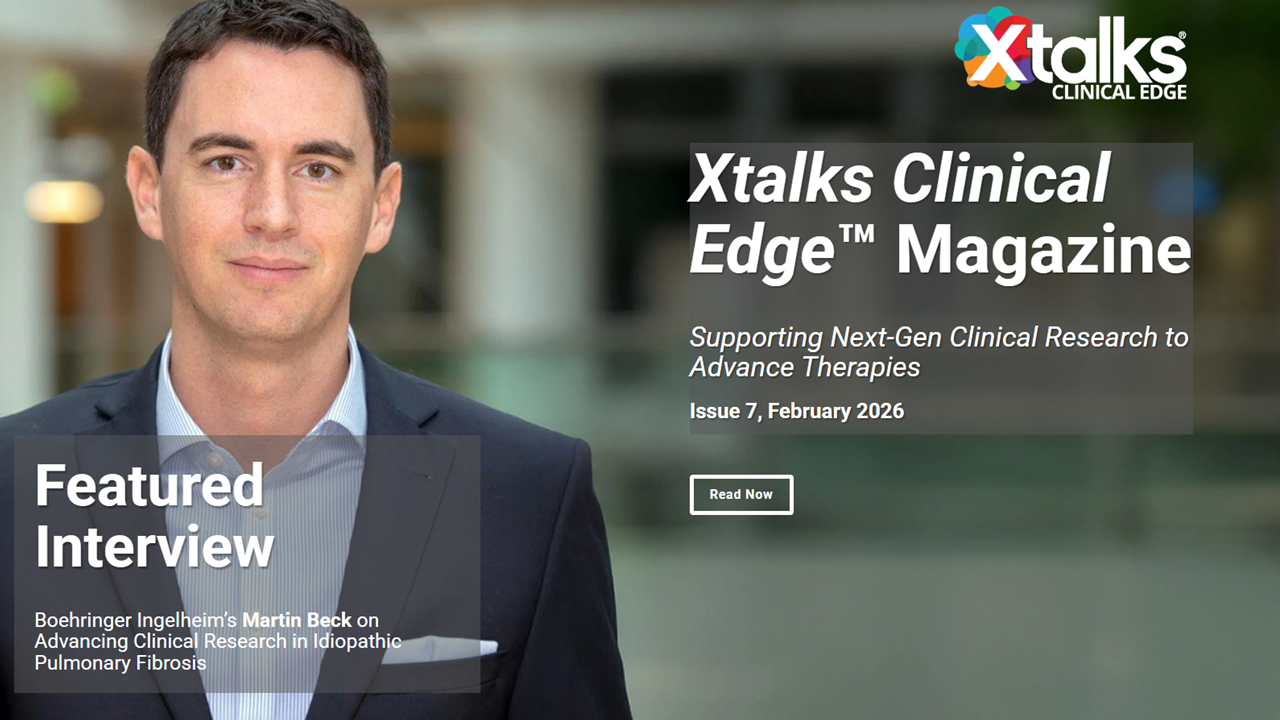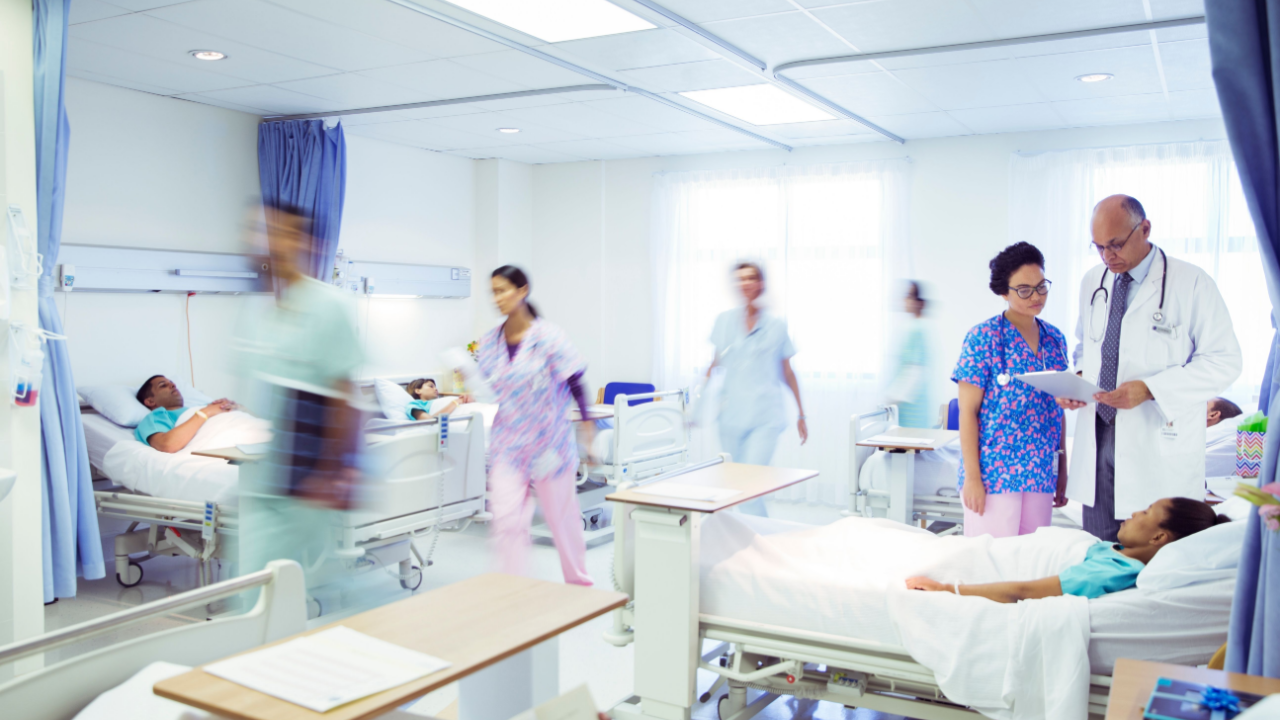Swiss medtech company Abionic has developed a disease severity and triage tool for the identification of individuals with, or who are at the risk of developing, severe COVID-19. The test is aimed at helping triage COVID-19 patients so that those with severe disease can be identified early, and be promptly offered appropriate treatment interventions.
The test involves a device called abioSCOPE which performs an analysis of a blood sample, and within just five minutes, can provide information on COVID-19 severity based on clinical parameters derived from serum biomarkers. Data from the device is evaluated using the cSOFA score (Covid Sequential Organ Failure Assessment) developed by the Abionic, which can assess clinical deterioration in patients.
Xtalks spoke to Nicolas Durand, PhD, CEO and co-founder of Abionic, to learn more about the tool. He explains how the test is the world’s most rapid diagnostic platform to detect disease severity.
The goal of the tool is to triage and monitor patients based on disease severity so that they can be treated in the appropriate units at a hospital, or discharged when deemed safe to do so. This would allow for more effective and efficient utilization of hospital resources including ICU beds which have been in danger of being in short supply throughout the pandemic.
Continuous monitoring provides healthcare practitioners with the tool to decide whether COVID-19 patients should be assigned to general wards, ICUs or be discharged from the hospital, preventing overload at hospitals.
abioSCOPE and cSOFA
Abionic first developed abioSCOPE in 2010 for allergy testing, and subsequently for sepsis and infection. Since then, it has been leveraged as a rapid diagnostic tool in several disease areas now including cardiovascular disease, traumatic brain injuries and as of March 2020, COVID-19.
Dr. Durand explains how “Abionic started with allergy testing [and] also developed tests for iron deficiency and other things. [However], given the unique selling point of the test, which is the time to results (because results can be obtained in five minutes without any preparation step), we decided to look to sepsis because sepsis is a huge topic. It’s the second-leading cause of death worldwide. And time is of the essence [as there is] a decrease in survival rates of eight percent for every hour of delayed treatment.”
Treatment for sepsis involves antibiotics. However, due to the growing problem of antimicrobial resistance (AMR), physicians are often reluctant to prescribe antibiotics. As such, there has been an explosion of sepsis cases worldwide, says Dr. Durand.
Patients with severe COVID-19 disease often require mechanical ventilation, which can introduce complications from other infections. Recognizing this, Dr. Durand says, “We realized in March that one of the leading causes of death in COVID-19 patients was sepsis. And it was bacterial sepsis from intubation because ventilation [involves] flooding air into the lungs of a patient. The air of a hospital is not so clean and contains bacteria.”
Dr. Durand explains that the bacteria-laden air can cause bacteria to be deposited in the lungs, leading to pneumonia and then sepsis. Since patients are in an induced coma when intubated, they show no reactionary signs of sepsis, leading to deterioration and death.
Given this, Dr. Durand says, “We proposed to some hospitals to test our device. We also compared it with some data from non-hospitalized patients and also patients that were hospitalized in wards, but not in the ICU. And then we created the COVID-19 severity score, which is called ‘cSOFA,’ or ‘COVID SOFA.’”
Abionic developed cSOFA based on the SOFA score, which is a standard and well-known assessment of severity in patients that is used in hospitals worldwide.
For COVID-19, the cSOFA score allows clinicians to make decisions on whether a patient should be admitted to a general ward or moved to an intensive care unit (ICU), as well as when they can be safely discharged from hospital. For example, a low score would suggest a safe discharge or a move from the ICU to the general ward, which would help prevent the tying up of limited ICU and general hospital capacities.
Nanofluidic Technology
abioSCOPE is a point-of-care laboratory quality test that can analyze up to 14 parameters simultaneously in a single drop of blood within just five minutes. This is compared to traditional blood tests that can take up to a week for results to arrive back at a clinic from a lab. As such, the device is positioned to revolutionize and disrupt the arena of blood testing.
abioSCOPE was bred out of Abionic’s cutting-edge, patented nanofluidics technology that was leveraged to develop the world’s most rapid diagnostic platform. The device has biosensors that contain nanochannels with nano-scale dimensions.
The technology involves driving molecules into the nanochannels, which only have to travel short distances of a few hundred nanometres, allowing incubation time to be lowered to just two minutes.

The platform involves the use of conventional ELISA immunoassay technology; however, by introducing a miniaturized opening and shortened distance, samples reach capture antibodies at the bottom of the apparatus much faster.
Dr. Durand explains, “This is a macro technology, meaning that molecules that have a size of a few nanometers have to diffuse over distances that are typically in the range of millimeters. If you relate that long distance to their size, it’s a very long travel. And this is why we have a typical incubation time of three hours for those kinds of tests. Now we do the exact same thing, but with [smaller] nanochannels.”
In addition, the volume of sample is also reduced, “which makes the system a confocal microscope, and then you don’t need to wash the samples to avoid measuring molecules that are still in solution. Everything is more simple. And because the nanofluidic chips are not in plastic, but in silicone and glass, it’s extremely well-defined and stable, which makes it very accurate in terms of results.”
In fact, the name abioSCOPE was generated by combining the name of “Abionic” with microscope, says Dr. Durand.
For the cSOFA assessment, indeed a 30 µl drop of capillary blood is sufficient. The test can be administered quickly by triage staff at a hospital, who can determine whether a patient requires hospital admission or can return home. This can help protect both hospital resources and allow for patients to receive appropriate, personalized care.
Validated Sepsis Biomarker
The abioSCOPE platform is designed to accommodate different tests for various disease applications. For example, there are different panels for evaluation of allergies, ferritin iron deficiency and sepsis. For sepsis, a commercial immunoassay pancreatic stone protein (PSP) test is utilized.
PSP is a novel biomarker that Abionic has already clinically validated and marketed. In critically ill patients, PSP can detect and predict severe complications such as sepsis and/or multiple organ dysfunction. A strong link between PSP concentrations and deterioration of patient condition was revealed in data from over 150 COVID-19 patients from the first wave of the pandemic in Europe.
PSP is mainly produced by acinar cells of the pancreas and secreted into the duodenum. PSP has been shown to be associated with islet cell regeneration and diabetogenesis, and may also play a role in pancreatic lithogenesis (formation of calculi or stones). Blood PSP concentrations have been shown to rise significantly during a septic event. This has been demonstrated in patients with severe burns.
The PSP sepsis test is combined with the SOFA score to evaluate disease severity. Dr. Durand says, “The idea is really to democratize the SOFA score in all departments of hospitals and not only ICUs. If a SOFA score is zero, you have no problem to send the patient back home. This is why we have fantastic performances in the patients we tested.”
The test has a demonstrated sensitivity of 100 percent and a specificity of 95 percent. “This is great for the triage of patients that we would like to send home without the risk of them developing complications. And we have also demonstrated that you can use the product to triage patients to the ICU, because ICU beds are very expensive and you don’t want to put someone there if they actually don’t need it. On the [other hand], you don’t want to avoid sending someone there when they actually need to be in the ICU.”
Dr. Durand says that the tool allows for good prediction of developing sepsis, which has been demonstrated in different technical studies that showed that the PSP biomarker is elevated between 24 and 72 hours earlier than the standard of care.
“We can definitively point out when something bad is happening and when there is urgency to take it seriously,” says Dr. Durand.
Moving Forward with abioSCOPE for COVID-19
For COVID-19, the PSP test is used on abioSCOPE’s platform to detect PSP concentrations. Evaluating the results using the cSOFA score, COVID-19 patients can be quickly assessed for evidence of sepsis-related complications associated with severe disease.
While the general SOFA score is complex and consists of six sub scores based on the evaluation of a number of different parameters, cSOFA is much simpler as it is based on the single PSP biomarker. Combined with the five-minute time to results from a single drop of blood, the test can make for quick and easy COVID-19 assessments.
The rapid, laboratory-quality diagnostic test can thus assist physicians in making early, appropriate clinical decisions at the point of need.
This approach benefits both patients and hospitals as patients can receive pertinent and timely treatment based on better defined clinical need, while hospitals can avoid being overrun by streamlining admissions and stays.
abioSCOPE is currently being trialed for COVID-19 in hospitals across Europe, including in Switzerland, Spain, France and Italy.
Data from some of the trials show that the cSOFA and SOFA score demonstrate good correlation among COVID-19 patients, and that the PSP test and cSOFA score enable clinicians to distinguish between non-severe versus severe SARS-CoV-2 infection among adults.
While abioSCOPE is currently only available in Europe (in Switzerland, France, Italy, Spain, Greece and Turkey), Abionic is preparing an application to the US Food and Drug Administration (FDA) for authorization.
While COVID-19 has brought on unprecedented challenges, innovation continues to lead the way forward and the way out. As such, Dr. Durand says it’s important to “give a chance to innovations, because in crises around the world [during] all times, innovation has always been one of the pillars to come out of a crisis. And it will be a pity if in this crisis innovators like us are not given a chance, because we can make a difference.”












Join or login to leave a comment
JOIN LOGIN